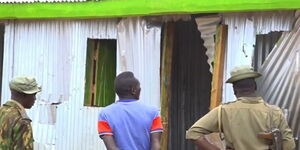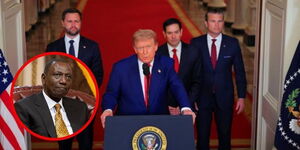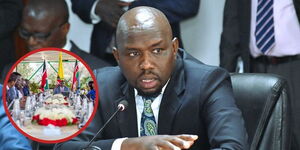Kenya's political landscape is buzzing after President William Ruto's recent Cabinet appointments, which include four senior members from the opposition ODM party. This move, aimed at fostering a 'broad-based government', has sparked intense debate and criticism amid ongoing unrest.
Francis Atwoli, Secretary General of the Central Organisation of Trade Unions (COTU-K), has urged Ruto to fill the remaining Cabinet post with younger Kenyans, while openly supporting the inclusion of opposition figures.
Atwoli’s endorsement comes as Ruto has faced mounting pressure from all sides, navigating through the chaos that has unfolded over the past weeks.
Ruto's decision to incorporate top ODM leaders into his administration follows significant public backlash and six weeks of nationwide protests. The President's strategy seems to be a calculated effort to bridge political divides and stabilise a country that has been rocked by social and economic turmoil.
However, the response from the public and opposition alike has been anything but positive.
The newly nominated Cabinet members from ODM are high-profile figures with substantial political clout. John Mbadi, a prominent ODM leader, is set to take on the role of National Treasury and Economic Planning Minister. Opiyo Wandayi is proposed for Energy, while Hassan Joho is slated for Mining and Blue Economy.
Wycliffe Oparanya is expected to head the Ministry of Co-operatives and MSMEs. These appointments signal a significant shift in Kenya’s political dynamics, bringing opposition voices directly into the heart of the government.
President Ruto defended his choices, praising the broad-based approach and the willingness of diverse organisations to set aside partisan differences. “Their readiness to join forces for the radical transformation of Kenya marks a historic gesture of patriotism,” Ruto remarked, pointing to his commitment to a unified government despite the turbulent backdrop.
Despite Ruto's assurances, the public's response has been largely negative. Young protesters, who had been vocal against the Finance Bill, 2024, argue that the inclusion of opposition leaders in the Cabinet merely perpetuates a cycle of co-opting political rivals without delivering tangible benefits to the populace.
Their frustration highlights a deeper dissatisfaction with the current political system and its failure to address pressing economic and social issues.
The protests, which, according to Kenya National Human Rights Commission, have claimed over 60 lives, underscore the severity of the crisis facing Ruto's administration. The demonstrations, initially triggered by the controversial Finance Bill, 2024, have persisted even after the President’s decision to shelve the proposed tax increases. Activists and opposition groups continue to call for Ruto's resignation, reflecting the growing discontent with his leadership.
The Cabinet reshuffle is not merely a matter of political manoeuvring but a critical response to the unrest that has disrupted economic activities and strained Kenya’s social fabric. The President’s attempt to include opposition figures could be seen as a strategic move to stabilise the situation and demonstrate a willingness to address the concerns of the protesting public.












